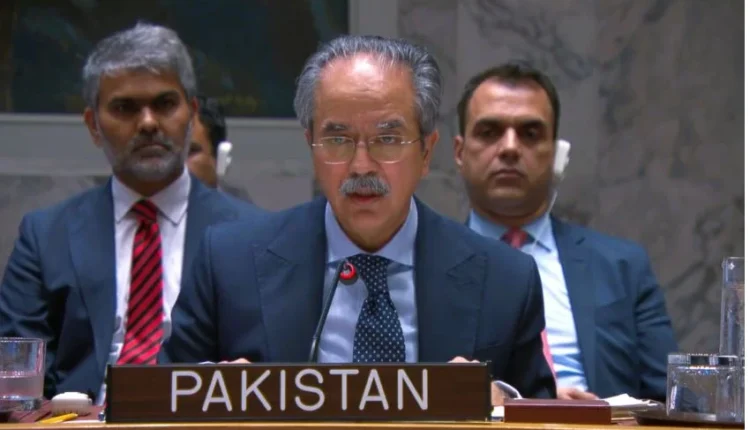Pakistan Urges UN to Act as TTP Threat from Afghanistan Intensifies
Ambassador Asim claimed that Pakistan has foiled multiple infiltration attempts by TTP and BLA militants from Afghan territory
WASINGTON: Pakistan has warned the United Nations Security Council that terrorism emanating from Afghanistan poses the “gravest threat” to its national security, urging the Taliban-led Afghan government to uphold its international counterterrorism commitments.
Speaking at a UN Security Council debate on the situation in Afghanistan, Pakistan’s Permanent Representative to the UN, Ambassador Asim Iftikhar Ahmad, said that the Tehreek-e-Taliban Pakistan (TTP)—with nearly 6,000 fighters—remains the largest UN-designated terrorist group on Afghan soil.
Ambassador Asim claimed that Pakistan has foiled multiple infiltration attempts by TTP and Balochistan Liberation Army (BLA) militants from Afghan territory and seized military-grade weapons left behind by U.S. and NATO forces during their withdrawal.
“These efforts come at a heavy price,” he said, referring to the recent martyrdom of 12 Pakistani soldiers in a single border incident. “This situation is intolerable.”
He revealed that over 60 terrorist camps are operating from Afghan sanctuaries, housing groups like ISIL-K, Al-Qaeda, TTP, BLA, and the Majeed Brigade, and facilitating joint training, weapons trade, and coordinated attacks on Pakistani civilians and law enforcement agencies.
Pakistan urged swift action on its proposal—backed by China—in the UN Security Council’s 1267 Sanctions Committee to designate BLA and Majeed Brigade as terrorist organizations, noting that the United States has already listed both groups.
Ambassador Asim also reiterated Pakistan’s longstanding call for constructive engagement with Afghanistan’s interim Taliban authorities. He warned that the Taliban sanctions regime should not become “hostage to political considerations” and stressed the importance of travel-ban exemptions to enable diplomatic efforts.
He cited a recent quadrilateral meeting in Dushanbe between Pakistan, China, Iran, and Russia, where the countries agreed on “result-oriented engagement” with the Taliban.
Read more: Key points of Pakistan-Saudi Arabia Strategic Mutual Defense Agreement
The Pakistani envoy also addressed the deteriorating human rights situation in Afghanistan, especially the restrictions placed on women and girls. “Continued restrictions on women and girls are inconsistent with Islamic traditions and norms of Muslim society,” he said.
Ambassador Asim noted that with the conflict over, many Afghans have been repatriated from Pakistan in a phased and dignified manner, while others remain under Pakistan’s liberal visa regime for family, education, medical, and business reasons.
He urged the international community to share the refugee burden equitably, reminding partners of long-delayed resettlement commitments for Afghan nationals.
“Pakistan has suffered the most as a result of Afghanistan’s decades-long conflict. We remain committed to supporting a peaceful, prosperous Afghanistan for the sake of our region and the good of the world,” he said.
Earlier in the session, Roza Otunbayeva, the UN Secretary-General’s Special Representative for Afghanistan, warned that the country is facing a “perfect storm” of humanitarian, economic, and human rights crises, despite a decrease in active conflict since the Taliban took power in 2021.
She particularly criticized the Taliban’s restrictions on women and girls, stating that girls above the sixth grade have been barred from schooling for four years—costing the Afghan economy an estimated $1.4 billion annually, according to the World Bank.
Read more: Key points of Pakistan-Saudi Arabia Strategic Mutual Defense Agreement
“A generation is at serious risk of being lost,” she warned, adding that ideology-driven decisions by the Taliban may prevent long-term stability.
Pakistan’s call to action underscores growing regional concerns over the re-emergence of cross-border terrorism and the Taliban’s failure to rein in militant groups operating from its soil. The debate also brought renewed international focus on the humanitarian and human rights crisis unfolding under Taliban rule.
As the UN deliberates its next steps, Pakistan continues to push for global accountability and collective responsibility to address the evolving threat landscape in South and Central Asia.






Comments are closed, but trackbacks and pingbacks are open.